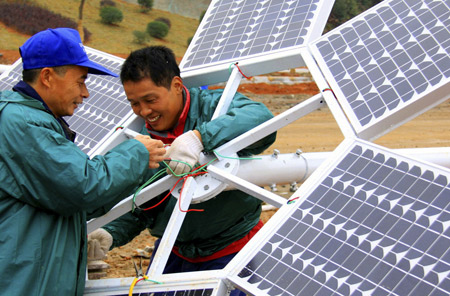The country's top legislature adopted on Saturday an amendment to the renewable energy law that requires electricity grid companies to buy all the power produced by renewable energy generators.
The amendment says the State Council energy department and the State power regulatory agency should supervise the purchases.

Technicians assemble a solar-powered street lamp in Jing'an county of Jiangxi province on December 11. Official statistics showed China as a leader in hydro and solar power usage last year.
The amendment, approved by lawmakers after it was heard the second time at a 5-day meeting of the National People's Congress (NPC) Standing Committee, aims to support the country's fledgling renewable energy sector.
It says the State Council energy department, in conjunction with the State power regulatory agency and the State Council finance departments, should "determine the proportion of renewable energy power generation to the overall generating capacity for a certain period".
Power enterprises refusing to buy power produced by renewable energy generators will be fined up to an amount double that of the economic loss of the renewable energy company, it says.
Renewable energy includes non-fossil fuels like wind and solar power, hydro power, and geothermal energy. Two-thirds of China's energy supply is fueled by coal and the country has become one of the largest greenhouse gas emitters.
"The legislation on improving the consumption of clean energy contributes to the global fight on climate change," said Wang Zhongying, director of the renewable energy development center of the Energy Research Institute under the National Development and Reform Commission.
A national plan on renewable energy development issued in 2007 set a target to increase renewable resources to supply 15 percent of its total energy consumption by 2020, in a bid to reduce greenhouse gas emissions and promote sustainable economic growth.
Statistics show renewable resources supplied 9 percent of China's total energy consumption last year, equivalent to reducing 600 million tons of carbon dioxide.
Signaling an official effort to shore up clean energy development and fight climate change, the law requires the government to set up a special fund for renewable energy scientific research, finance rural clean energy projects, build independent power systems in remote areas and islands, and build information networks to exploit renewable energy.
The fund will be managed by the finance, energy and pricing sectors of the State Council.
Official statistics show that last year, China used more hydro and solar power than any other country and its use of wind power ranked fourth in the world.
However, industry experts estimated that one-third of the country's wind-generated electricity could not be transmitted efficiently across the grid. Therefore, the amendment requires grid companies to "improve transmitting technologies and enhance grid capability to absorb more power produced by renewable energy generators".
"Renewable energy power in the country's resource-rich, underdeveloped northwestern region must be sent to the resource-scarce, prosperous coastal area," Wang said, noting that Gansu province and the Inner Mongolia autonomous region could not by themselves consume all the wind-generated electricity that they produced.
However, Wang said the relative independence between grids in the country made simultaneous transmission difficult.
Xiao Liye, director of the Institute of Electrical Engineering of the Chinese Academy of Sciences, suggested the use of "smart grids" as a solution.
The safe, efficient and reliable "smart grids" included an intelligent monitoring system that could integrate alternative sources of electricity, such as solar and wind, on a large scale, the grid expert said.
He said "smart grids" and renewable energy should be developed together like "twin brothers".